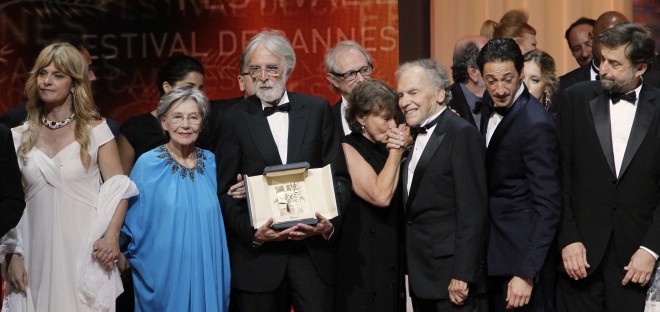A palliative love story wins the Palme d’Or in Cannes
Cronenberg’s ‘Cosmopolis’ is shut out, but so is every one of the seven North American films in competition
From left, actors Nastassia Kinski, Emmanuelle Riva, director Michael Haneke with the Palme d’Or award for Love, an unidentified person, actors Jean-Louis Trintignant, Adrien Brody and President of the Jury Nanni Moretti pose during the awards ceremony at the 65th international film festival, in Cannes, southern France, Sunday, May 27, 2012. (AP Photo/Francois Mori)
Share

Nanni Moretti’s Cannes jury loves l’Amour, a movie about love and death. It awarded the festival’s top prize, the Palme d’Or, to Austrian director Michael Haneke for his tender, palliative chamber piece about an elderly French couple living out their final days in a Paris apartment, as the husband (Jean-Louis Trintignant) copes with a debilitating stroke suffered by his wife (Emmanuelle Riva). It’s Haneke’s second Palme, after The White Ribbon (2009). His movie is not a marvel of direction so much as acting. Speaking to the press after the ceremony, jury president Nanni Moretti pointed out that Amour‘s elderly thespians also deserve credit, but the jury is not permitted to give other prizes to the Palme winner.
The best actor prize went to Mads Mikkelsen for his intense, finely calibrated performance in The Hunt, as a divorced man whose life is ruined after a young girl falsely accuses him of sexual abuse. Upsetting speculation that the best actress award would go to Marion Cotillard for her role as a legless amputee in Rust and Bone, it instead was shared by the actress duo in Cristian Mungiu’s Beyond the Hills (Cristina Flutur and Cosmina Stratan)–for their roles in the harrowing true story of an exorcism performed on a young woman who tries to liberate a nun from a monastery. Mungiu, a former Palme winner for 4 months, 3 weeks and 2 days, also won the screenplay prize. Pointing out that his film was non-fiction, he said, “People have really suffered. I don’t think we can fix the past with our films but hopefully we can make the future a little better.”
David Cronenberg’s Cosmopolis was shut out of the awards. But if it’s any consolation, with 22 features in the main competition, all of the seven North American entries were snubbed by the jury. With the strong North American presence this year, the festival seemed keen to lure stars like Brad Pitt, Robert Pattinson and Nicole Kidman to the red carpet, but honouring their work seems a bigger stretch. American director Benh Zeitlin’s Beasts of the Southern Wild, a powerful drama about flood victims in the Louisiana bayou, won the Camera d’Or for best first feature. However, it played outside the competition, in the Un Certain Regard sidebar. Zeitlin said his movie was “the first film of almost everyone who worked on it. It’s an award for courage and faith as much as skill.” Effusively grateful about being recognized at the high altar of world cinema, he added: “Cannes is the temple. This is a wild movie, and you never know if you’re going to be allowed to dance in the temple.” (It was announced earlier that Suzanne Clément won the Un Certain Regard best actress award for Quebec director Xavier Dolan’s Laurence, Anyways—the only prize going to a Canadian in Cannes.
The competition’s second place Grand Prix—don’t ask me why they call it that—went to Matteo Garrone’s Reality, starring Aniello Arena as a fishmonger trying to win a spot on an Italian reality TV show. (For the last 20 years Arena has been a prison inmate for his role in a Mafia triple murder, and received permitted to shoot the film but not attend the festival.) British veteran Kenneth Loach, competing for the 11th time in Cannes, took the third-place Special Jury prize for The Angel’s Share, his social realist tale about a convicted offenders doing community service who engineer a heist of priceless scotch whiskey.
With the exception of Carlos Reygadas’ Post Tenebras Lux, which won the award for best director, all the films honoured by the jury are straight-ahead, realist narratives. More experimental work–including the two limo odysseys, Cosmopolis and Holy Motors–were ignored. Moretti acknowledged that the three films that most divided the jury were, in fact, Holy Motors, Post Tenebras Lux and Paradise:Love. Haneke’s Amour was well-loved in Cannes, thus a popular choice. But it came as something of a surprise to insiders. It was common knowledge that Moretti is not fond of Haneke. For once, it seems, art transcended politics.
Follow Brian D. Johnson on Twitter: @briandjohnson